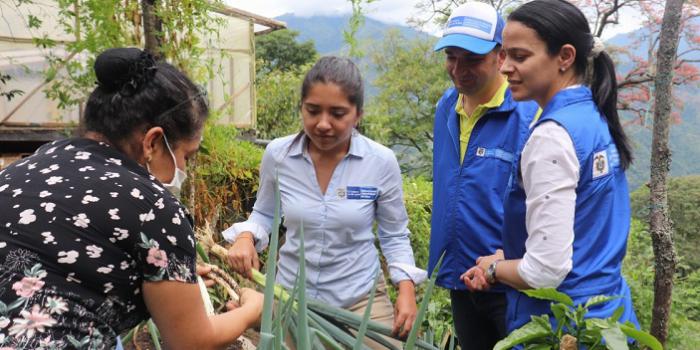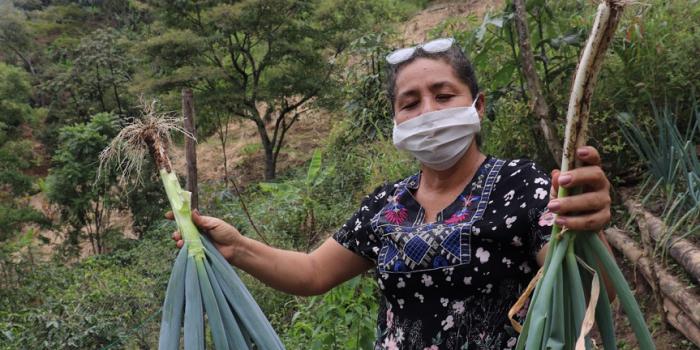
Reaping hopes
Despite the fact that violence withered the love of her life, the spirit of a mother and faith in God have been the bulwark for Beatriz Prada, a peasant woman from southern Tolima, to have managed to overcome adversity.


By William Peña Gutiérrez
For Beatriz Prada remembering the day she received the fatal news of the murder of her husband José Educardo Vargas Hueje, it is one of the few situations in which her smile, her joy and the kindness of her face that identifies her as a peasant woman disappears and entrepreneur from the south of Tolima.
It was 2006, and on her farm in San Joaquín Bajo hamlet, in the municipality of Planadas, life passed in the middle of the guerrilla conflict, but also among plans and projects to help the family move forward. Her husband, a hardworking man, restless leader and member of the town's conciliatory committee, and the only and eternal love of her life, was murdered without a motive and without an explanation.
"Because of his nobility, they shot him twice, and the saddest thing is that they never knew why", says Beatriz, closing her eyes, sighing and lowering her head to hide her grief. In the midst of onions, coriander and vegetables, she catches her breath and her eyes seem to shine as she describes the process that has allowed her to have a small, but very varied garden.
She extends her arm, points towards the deep part of the steep slope where she grows coffee and for a moment she stops her hand and points her right index finger to indicate that on that reddish roof that prevails among the green of the crops she lived the saddest scene of all her life: “There in that house, where that zinc roof looks out, that was where I saw my beloved husband for the last time; I really fell in love with him”, she recalls.
She says that they have been battling for 13 years with her children, Carolina, Diego Fernando and Daniel, with whom she initially fled out of fear, leaving the farm for a period of four years and three months, a time in which in addition to facing her own fears she had than living in an unknown world and without opportunities in cities like Neiva and Bogotá. "The mistake of a victim, is to run into difficulties", she reflects.
Once she returned, Beatriz was filled with courage, she assumed the reins that she lost with the departure of José Educardo, and now empowered as a female head of the household, not even the hip ailment due to the effects of osteoarthritis manages to subdue her. “I have had several physical and moral blows, but I go back and get up; loneliness and pain are there, but God and my children help me to get ahead" she adds.
To diversify the cultivation of coffee, she works planting cassava, avocado, banana and corn on the three hectares that make up her farm; she knows that life has more than one chance and that it is not convenient to depend on a single product. This is also the reason why she applied as a beneficiary of the rural home garden improvement project implemented by the Victims Unit, within the framework of the prevention of victimization events, and with which it seeks to guarantee food sustainability to 150 families affected by the armed conflict in this municipality.
“I thank God that I didn't think they were going to select me; This support from the orchards comes at a truly opportune moment. My goal is to plant 100 onion plants and, from then on, tomato, beans, coriander, lettuce and strengthen my garden”, she says.
A goal that, she assures, will meet the fertilizer, seeds and tools that she received within the agricultural project and that had the particularity of receiving directly from the deputy director of the Unit, Lorena Mesa, and the director of the Central Territorial, Maria Jose Dangond, who visited her on her farm.
“Hopefully we all put on our boots to take advantage of these grants. I plan to expand this garden by about 40 square meters and benefit the people of the town with my products”, she concluded while thanking them for the benefit.
Planadas is one of the four municipalities of Tolima that are part of the 170 in the country prioritized with Development Programs with a Territorial Approach (PDET), for being one of the territories most affected by the armed conflict, with the highest rates of poverty, presence of illicit economies and institutional weakness, where the State now has as its main objective to achieve the structural transformation of the countryside and rural areas with the active participation of the communities, in processes such as those led by the Victims Unit and with which it benefits resilient women like Beatriz Prada.
(Fin/WPG/EGG/LMY)






